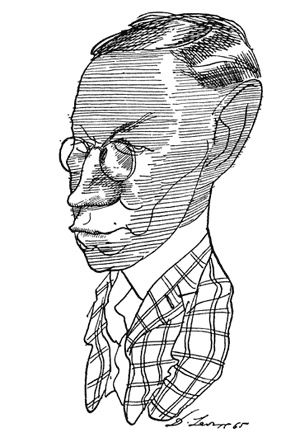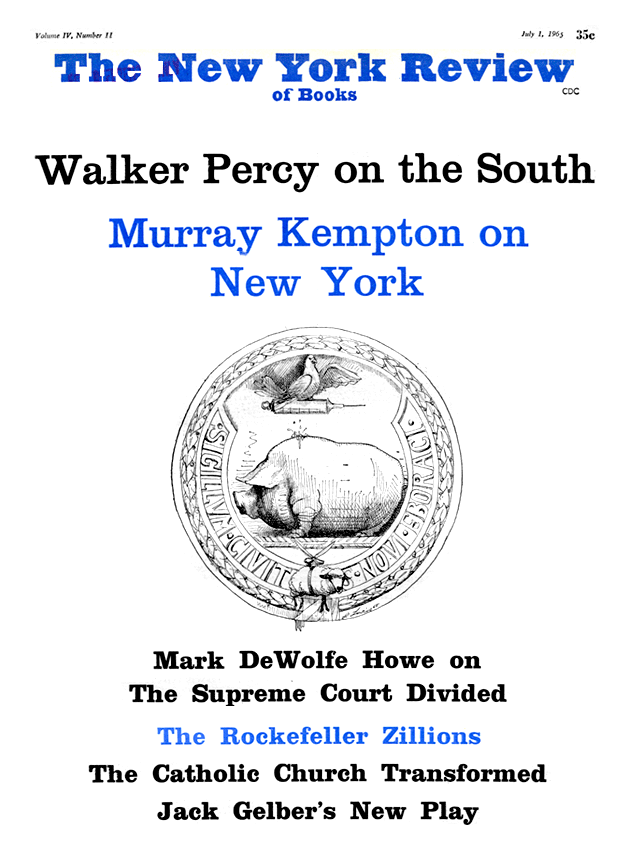One reason why Herbert Croly remains a somewhat mysterious figure in American political thought is that the first forty years of his life are largely a blank. Croly left neither private papers from that period nor a public record which in the absence of letters and diaries would at least permit inferences about what kind of person he was. All that is known of his childhood is that his parents, Comtean intellectuals and reformers who came to America from England, brought him up in the Positivist faith, in a household which appears to have been emotionally a little austere. His career was a long time getting under way. Born in 1869, he did not even receive his B.A. from Harvard until 1910, a year after he published The Promise of American Life. At Harvard he had taken courses from Josiah Royce, George Santayana, and William James. For a time he edited The Architectural Record. He wrote two books on architecture, Stately Homes in America and Houses for Town and Country. At one point he suffered a nervous breakdown and went to Europe to recover.
Just how all this led to The Promise of American Life will never be very clear. But it is easy to explain why The Promise of American Life led to national attention; to The New Republic, founded by Willard Straight in 1914 under Croly’s editorship; and to a notable career as the foremost liberal journalist in the country. These things happened largely because Theodore Roosevelt read The Promise, found it highly flattering to himself, publicly praised it, and used it as an argument for his “new nationalism.” Croly did not so much influence Roosevelt as read into his career an intellectual coherence which Roosevelt then adopted as his own view of things. But the important fact is that Roosevelt admired the book and gave The New Republic his moral support. Eventually his crusade for military preparedness alienated Croly, who turned to Wilson instead and made The New Republic into the most high-toned, if not the most influential, organ of Wilsonian liberalism. In 1919 Wilson disappointed him too by signing a peace which Croly thought would only lead to more wars. Deserting Wilson, Croly flirted with socialism and with hopes of a farmer-labor coalition. Later he turned more and more to spiritual exercises—a throwback, perhaps, to Comte’s religion of humanity. A. R. Orage, an English follower of George Gurdjieff, interested him in “psychosynthesis.” Edmund Wilson, in a memorial essay written after Croly’s death in 1930, believed that Croly’s later writings “represented an attempt…to explain to his rational intelligence” the “well-spring of spiritual power.” “It did not seem,” Wilson added, “that he was ever successful.”
The religious, mystical phase of Croly’s career is not the phase that appeals to the dominant school of liberal historians. They prefer the earlier Croly, the admirer of Roosevelt and author of The Promise of American Life. If they have made the earlier Croly one of their patron saints, it is not hard to see why. Croly advocated tough-mindedness, pragmatism, and political realism—virtues much admired today. He urged liberals to abandon their suspicion of the national state. He urged them, moreover, to support a vigorous assertion of national power abroad, in preference to the vague internationalism which had formerly characterized the liberal approach to foreign policy. It hardly needs to be said that American liberals have followed Croly’s advice. Even during his own lifetime they gave signs of following it further than Croly himself was willing to go.
Arthur Schlesinger, Jr., in his Introduction to this reissue of The Promise of American Life, says that the book is “cogent,” “thoughtful,” and “eloquent.” He can praise it sufficiently only by showing its close correspondence to certain passages in Winston Churchill’s Liberalism and the Social Problem, published in the same year. The parallels are striking enough. Not all readers will find this fact a point in Croly’s favor, but everyone can agree with Schlesinger that The Promise of American Life rests on the “conception of the American past as a drama of ideas embodied in personalities.” This conception of history as a drama of ideas, I would argue, is not only central to the book; it also explains what is wrong with it.
Croly saw the American past as a dialogue between the Jeffersonian and Hamiltonian traditions. In itself this idea, even in 1909, was not particularly original. What was original was a democrat’s admitting that his own preferences lay “on the side of Hamilton rather than of Jefferson.” Croly admired Jefferson’s democratic sympathies but distrusted his “amiable enthusiasm.” He distrusted Hamilton’s aristocratic proclivities but admired his nationalism. What was necessary, Croly argued, was to combine the good features of each; but he wanted the Hamiltonian thread to be the stronger of the two. After years of drift, the country needed mastery.
Advertisement
Up to a point, Croly was saying only what other critics—Lincoln Steffens, for example—were saying; he was pleading, as Steffens would have put it, for “intelligence” in place of “virtue.” But again, what was unusual about Croly’s book was the association of “intelligence” with Hamilton, an association which led to important mistakes. It was a mistake, for instance, to confuse Hamilton’s eighteenth-century mercantilism with twentieth-century social planning. It was a mistake more serious still to suppose that Hamilton’s nationalism could conveniently be detached from the particular social and economic arrangements which Hamilton was interested in promoting. Like many American historians, Croly had a way of emasculating history by insisting on the primacy of what Schlesinger calls the drama of ideas. That Hamilton was not only a nationalist but the spokesman for a particular economic interest, and that his remarkable rise to power was bound up with the fortunes of these interests, were considerations altogether beneath Croly’s attention. He did not even mention the Alien and Sedition Acts—the more sinister side of Hamilton’s nationalism. He not only ignored them but went on blithely to argue that it was Jefferson, not Hamilton, whose policies had reduced the country to a dead level of intellectual conformity. The perversity of Croly’s historical judgments reflects the American intellectual’s need to identify himself with the hard-boiled, “tough-minded,” aggressively masculine attitudes which Croly saw in Hamilton and his horror of the softness and effeminacy, as they appeared, of Thomas Jefferson. The pity is that this kind of posturing has so often set the tone of American political debate. Worse, it has been persistently confused with political realism. Thus Schlesinger calls Croly “a realist without illusion about the role of force in life.”
Actually the role of force was precisely what Croly, with his assumptions about the overriding importance of ideas like nationalism and democracy, was unable to understand. And it is Croly’s failure to understand the problem of power that explains the futility of the program he proposed as the solution to the evils of industrial capitalism. His program consisted of a single demand: the national state should be made more powerful. If he had really had no illusions about power, he would have coupled this demand with a demand that the state be made more responsive to the people it governed. Croly assumed that he had disposed of the problem merely by suggesting that Hamilton’s nationalism might be infused with something of the spirit of Jefferson’s democracy. But the question was whether it was structurally possible to strengthen the state without merely strengthening the corporate interests which enjoyed the easiest access to it. Was it possible—to cite a familiar example—to set up regulatory agencies that would not fall into the hands of the interests they were supposed to regulate? Nothing has happened to suggest that it was. On the contrary, the growing power of the state, far from having been achieved at the expense of the great corporations, has not only enhanced them but many times saved them from the consequences of their own technological obsolescence.
Some of these things might have been anticipated by reformers concerned not with the forms and gestures of realism but with its substance. The “new nationalists” have been praised again and again for their appreciation of strong government, while the followers of Robert LaFollette have been derided for wishing to take the country back to the economic conditions of the nineteenth century. The naiveté attributed to LaFollette has in turn served the modern advocates of centralism as a powerful argument against decentralization—though why the failure of LaFollette’s crusade against bigness means that it was therefore wrong-headed is an interesting question in itself. Given the central premises of industrial capitalism, and especially its concern with the production of profits, bigness is inevitable, and the advantage in the continuing debate about bigness lies with the advocates of centralization from Croly to John Kenneth Galbraith. The premises themselves, however, have to be weighed against certain human values with which centralized power may be incompatible. The most interesting feature of the debate has always been the failure of the realists to deal coherently with the question of how centralized power is to be controlled. Thus Croly quite properly dismissed the progressive solutions—the initiative, referendum, and so on—as gimmicks, but he also dismissed the whole problem of popular control, the problem of power, the problem on which everything else depended. Instead he fell back on the uplifting sentiment that Americans could “safely trust [their] genuine interests to the keeping of those who represent the national interest.” The opponents of centralization, the “utopians,” from LaFollette to Paul Goodman, may have had the better of the argument after all.
Advertisement
This Issue
July 1, 1965



